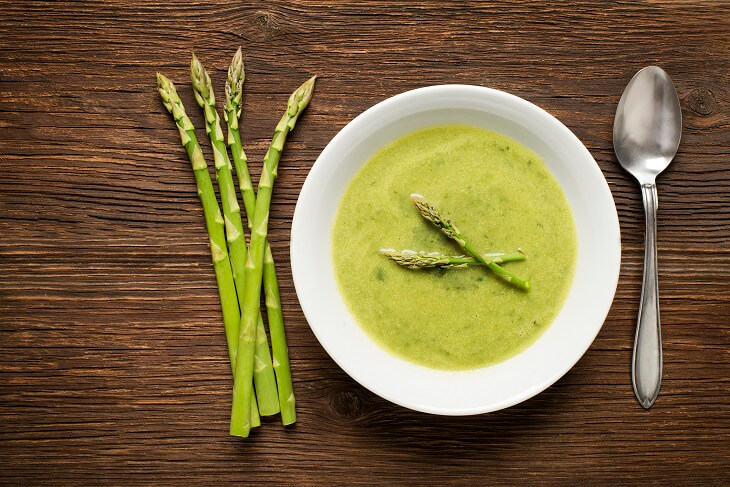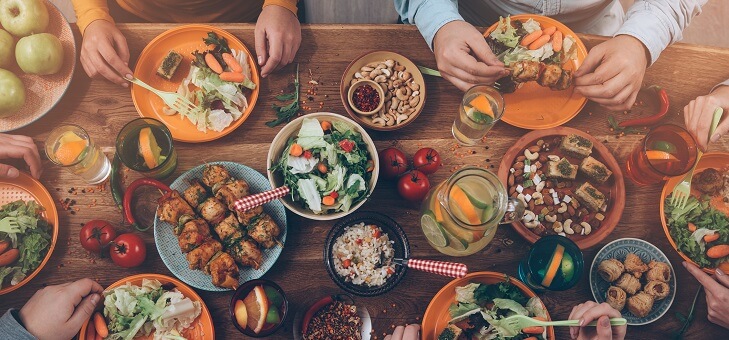Ever had to adjust your waistband because you’ve eaten too much – but somehow, you still find space for a bit of dessert?
Scientists may be yet to prove what many of us already know (that separate dessert stomachs are real things), but they have shed some light on why, sometimes, feeling full might make us want to eat even more.
Researchers from the University of Vermont found that learning to associate fullness with getting more food can trigger further feelings of hunger, even when we couldn’t possibly need to eat more. It’s psychological conditioning, and while the study was carried out on rats – Dr Mark Bouton and Dr Scott Schepers conditioned 32 female rodents to know they’d get a tasty treat if they pushed a lever while they were full, whereas they’d get nothing if they pushed it while hungry – it’s a bit like how we’re taught as kids that if we eat everything on our plate, we’ll be rewarded with dessert.
Retraining our brains out of such habits can be tough, but that doesn’t mean all hope is lost when it comes to keeping a healthy sense of portion control. Here are some top tips that could help if you struggle to stop eating, even when you’re full.
Read: Subtle ways your body is telling you to change your diet
1. Be mindful of why you’re eating
Lots of us eat for comfort, or to reward or soothe ourselves – and it can lead to compulsive cycles, but taking time to acknowledge what’s going on emotionally is a helpful step. “Before you eat, notice if you are actually hungry or not. Are you eating for a reason other than hunger? If so, it could mean you will never reach a point of satisfaction. Think about if this will truly help with whatever may be behind your want to eat,” says Lisa Beasley, anti-diet crusader and founder of My Body Positive.
2. Check in as you chew
Tend to go into a trance when you eat? If the concept of leaving anything on your plate is just downright alien to you – you’re not alone – but Ms Beasley suggests trying to learn to “listen to your body while you’re eating”. “Take a moment to stop and notice the sensations. If you reach that ‘Christmas day’ feeling of feeling stuffed, [ask yourself], ‘Is this actually a pleasant sensation?’ Remember, you are eating with the intention of feeling good when you’re finished.”
3. Snack happy
Eating healthy snacks is a great way to avoid getting too ravenous at mealtimes. “Snack on an egg,” suggests nutritionist Shona Wilkinson. “These make a great snack as the combination of protein and good fat help you feel fuller for longer. Try boiling them in advance, and keeping them in the fridge as an easy snack to enjoy on the go. They will last up to a week.”
Read: How to lose weight without running or changing your diet
4. Stay well hydrated
“Sometimes thirst can actually be mistaken for hunger,” says Ms Wilkinson. “We feel like we’re craving something and interpret this as hunger, when actually all we need is a glass of water!” So make sure you’re drinking enough H20 – and that means sipping throughout the day, not just drinking a huge amount when you feel a dehydration headache coming on. “Water is also needed in order for our cells to make use of the nutrients in the food that we eat, and lack of nutrient availability causes our body to crave more food,” Ms Wilkinson adds.
5. Bulk up
This might sound like a no-brainer – but make sure your meals are actually satisfying. Remember, carbs are a necessity, not the enemy – so don’t be fooled into thinking you need to ditch potatoes, pasta and rice – and dense, high-fibre foods such as root vegetables, beans and pulses are a great way to bulk out meals.
6. Breakfast like a boss
Get breakfast wrong and you might be paying the price in out-of-whack energy levels and cravings all day long. “Oats are brilliant for keeping hunger pangs at bay. They are nutritious and contain a good amount of fibre,” says Ms Wilkinson. “They have been shown to help balance blood sugar levels, thus keeping sugar cravings and hunger pains at bay.”
Read: Commonly consumed foods that can sap your energy
7. Enjoy a soup starter

“If you have soup before a meal, you will end up eating fewer calories during the meal. The soup gives you the sensation of being fuller because it remains in the stomach for longer and makes you feel more satisfied,” says nutritionist Dr Marilyn Glenville. “In addition, the soup remaining in the stomach stops the cells in the stomach producing your hunger hormone ghrelin and turns off your appetite.”
Do you struggle with portion control? Do you find yourself reaching for seconds even though you’re full? Let us know in the comments section below.
– With PA
If you enjoy our content, don’t keep it to yourself. Share our free eNews with your friends and encourage them to sign up.

